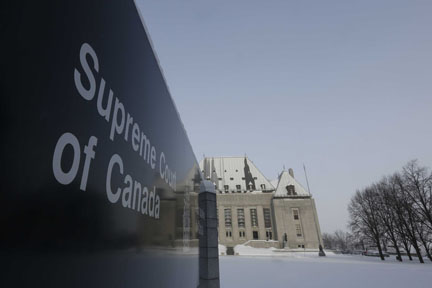
The Supreme Court of Canada’s winter session kicks off next week, with hearings that deal the usual assortment of criminal and business matters, and the occasional Charter challenge. This season, the top court is focusing on procedural and evidentiary issues, although there are plenty of high-profile criminal appeals on the schedule.
 Privilege and the legal industry
Privilege and the legal industry
First order of business this session is a request by federal lawyers’ to extend the 12-month deadline for assisted-suicide legislation after the landmark Carter ruling of February of last year. Opposing them is the British Columbia Civil Liberties Association, which is arguing that an extension would punish patients suffering with intolerable conditions.
Also in the first week, the SCC will be reviewing the value of cumulative evidence in Seruhungo v. R. The appellant here was originally acquitted of manslaughter, after the trial judge assessed the independent value of 19 pieces of corroborating evidence. The Alberta appeal court ordered a new trial after finding that, despite their being no single piece of conclusive evidence, the cumulative value of all the corroborating evidence should have been taken into account.
On Jan. 18, the top court will wade into the murky waters of judicial independence, and the compensation of judges. The applicants in Conférence des juges de paix magistrats v. Quebec are justices of the peace who argue that new provisions under the Courts of Justice Act that reduce their compensation have the effect of compromising judicial independence.
Another Quebec-based legal-industry case will be heard on March 24, in Chambre de l’assurance de dommages v. Aviva Insurance. Here, the appellant is a regulator that was pursuing an ethics inquiry against a claims adjuster. The respondent, however, used solicitor-client privilege to withhold certain documents. That leaves it up to the SCC to determine whether the relevant provincial legislation affords such protections.
Overstepping their authority?
In March, the court will be hearing arguments for a couple of peculiar cases where the courts and regulators may have crossed the line.
The first, set for March 23, is Edmonton v. Capilano Shopping Centres. A shopping mall challenged its tax bill of $31 million and was upwardly reassessed for $41 million. On appeal, the court found the City of Edmonton had gone beyond its authority to review the appeal and instead “cross-appealed” its own assessment. The decision will no doubt have huge ramifications for business.
The second, a case out of British Columbia, Anthony-Cook v. R., involves a manslaughter conviction wherein the defence and Crown made a sentencing deal for 18 months with no probation. The judge, however, rejected the joint submission and imposed a sentence of 24 months with three years’ probation. The Supreme Court will review the test that should be applied when deciding whether to accept such a plea deal.
Sex, violence, and privacy
The SCC will also be called upon to rule on a few criminal cases that will be sure to polarize public perceptions.
In Spicer v. R., set for Jan. 15, the court will review the contentious “mistaken belief” defence for sexual assaults. The case involves a man who was convicted of sexual assault, but argues the victim was heavily intoxicated and invited the encounter. The SCC will review whether the mistaken belief of consent is a legitimate defence.
Finally, on Feb. 24, the SCC will weigh privacy against the public interest in a child pornography case emanating from Alberta. In R. v. Villaroman, the respondent was convicted after he brought his computer into a repair shop, where the technician stumbled upon the illicit content. Here, the SCC will determine whether Charter protections are applicable in such circumstances.